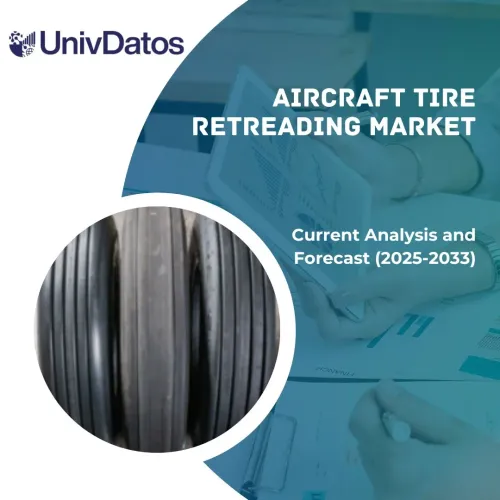- Home
- About Us
- Industry
- Services
- Reading
- Contact Us
Advanced Air Mobility Market: Current Analysis and Forecast (2024-2032)
Emphasis on By Application (Cargo, Passenger, Mapping, Special Mission, Surveillance and Monitoring, Others); By End-User (Commercial (E-Commerce, Commercial Ridesharing Operator, Private Operators, Medical Emergency Organization, Others), Government), By Propulsion (Gasoline, Electric, Hybrid), By Component (Hardware (Aerostructure, Avionics, Flight Control Systems, Propulsion Systems, Others), Software) and Regions (North America (The US, Canada, Rest of North America), Europe (Germany, The UK, France, Italy, Spain, Rest of the Europe), Asia-pacific (China, Japan, India, Rest of the Asia-pacific), Rest of the World)
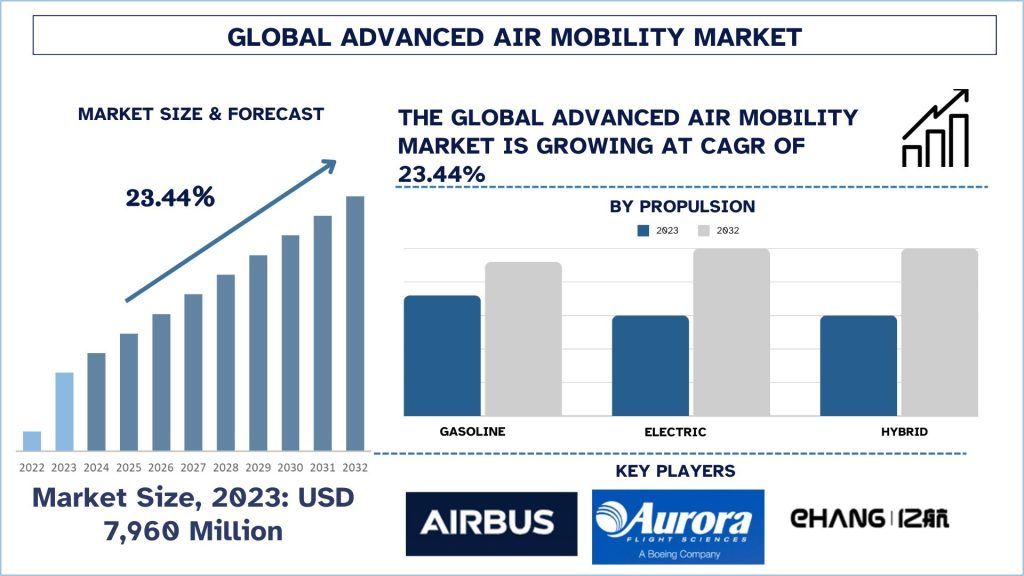 Global Advanced Air Mobility Market Size & Forecast
Global Advanced Air Mobility Market Size & Forecast
The Global Advanced Air Mobility Market was valued at USD 7,960 million in 2023 and is expected to grow at a strong CAGR of around 23.44% during the forecast period (2024-2032) owing to rising demand for mobility solutions among the rapidly urbanizing cities across the globe.
Global Advanced Air Mobility Market Analysis
Advanced Air Mobility refers to new-age technologies which focuses on how to transform air-based travel and goods transport across the globe. As air mobility is one of the key reasons for the carbon emissions, the companies in the sector are extensively investing towards the adoption of electric based air mobility solutions in order to enhance the efforts towards carbon-neutrality of the countries. Various type of aircraft as Electric vertically take-off and landing vehicles, electric and hybrid aircraft, urban air mobility, and Unmanned aerial aircraft are among the prominent category of vehicles used for advanced air mobility solutions.
The Global Advanced Air Mobility market was valued at USD 7960 million in 2023 and is expected to grow at a strong CAGR of around 23.44% during the forecast period (2024-2032). One of the key factors that have been attributed to the growth is increasing number of companies offering advanced air mobility solutions. With the growing numbers of companies increasing their offering in new regions the available options for advanced air mobility solutions would also be a viable alternative for the customers. For instance, in 2024, the aviation ministry of India launched urban air mobility project to initiate first air taxi in India by the year 2026. These air taxis will start in Delhi NCR, Mumbai, and Bengaluru by 2026.
In another instance, in 2024, South Korean telecom company SK Telecom showcased its prototype air taxis named UAM which the company is anticipating initiating operations by the year 2025.
With the rising demand for commercial air mobility and the increasing traffic congestion leading to higher time of travel for both within city and intercity travel the demand for advanced air mobility is further anticipated to increase. Additionally, the services have also become crucial for transporting various crucial services such as air ambulance, disaster management etc. Additionally, various new government policies and regulations placed for the development of the air mobility services. The demand for the advanced air mobility services is further anticipated to rise during 2024-2032.
Global Advanced Air Mobility Market Trends
This section discusses the key market trends that are influencing the various segments of the Global Advanced Air Mobility Market as identified by our team of research experts.
Integration with Smart Cities
The integration of advanced air mobility solutions with the smart cities is another crucial factor that could attribute to the increased adoption of such solutions. With the increasing urbanizations the governments across the globe are moving towards the development of smart infrastructure-based cities which can not only accommodate a large population but also can provide ease of living through usage of sustainable technologies and low-emission based faster transportation medium. Considering this, the adoption of electric vertically take-off and landing vehicles (EVTOLs) adoption for air taxis, air ambulance, surveillance and monitoring, aerial mapping and providing cargo services to the population could become a viable alternative.
Considering all the possible growth potential for the advanced air mobility solutions along with the development of smart cities the market is anticipated to rise in the forthcoming years.
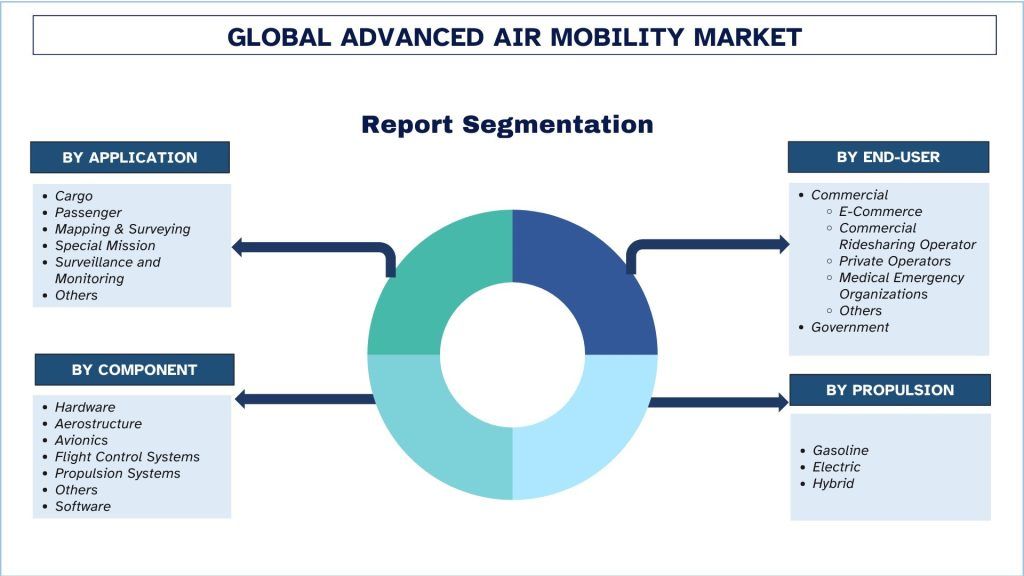
North America is Expected to Hold Major Market Share During Forecast Period
North America Advanced air mobility market has held a sizeable market share in 2023. Some of the factors attributed to the growth are the higher number of companies operating in the region such as Airbus, Boeing, etc. Additionally, the region is also home to urban air mobility, faster air ambulance services, extensive expenditure on the healthcare among the leading countries, etc. Additionally, the region has also focused on the usage of advanced air mobility solutions for logistics and goods delivery. Recently many of the new developments in advanced air mobility solutions have been observed which would be crucial for the development for the market growth.
For instance, in 2023, one of the leading advanced air mobility services provider Advanced Air Mobility (AAM) announced its partnership with the Amazon Web Services (AWS) to develop a city-wide infrastructure for electric-powered air taxis. These air taxis will be electric vertically take-off and landing based and would help revolutionize urban air mobility in the coming years.
Global Advanced Air Mobility Industry Overview
The Global Advanced Air Mobility market is competitive and fragmented, with the presence of several global and international market players. The key players are adopting different growth strategies to enhance their market presence, such as partnerships, agreements, collaborations, new product launches, geographical expansions, and mergers and acquisitions. Some of the major players operating in the market are Airbus S.A.S., Aurora Flight Sciences, Bell Textron, The Boeing Company, EHang, Eve Air Mobility (Embraer S.A.), Joby Aviation, Lilium GmbH, JetSet Go Aviation, and Volocopter GmbH.
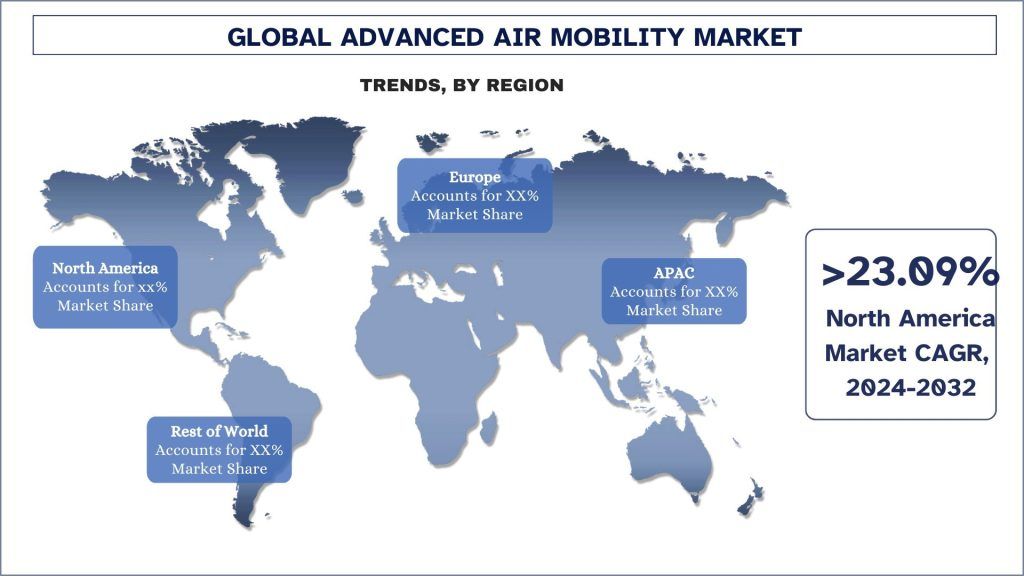
Global Advanced Air Mobility Market News
According to Rolls Royce around 15,000 EVTOLs will be needed across 30 major cities by the year 2035. It would also require the addition of 2,500 vertiport where aircraft can be fully-charged.
In 2024, EHang conducted its first demonstration flight with the passengers in its EH216-S pilotless aircraft. EHang has delivered 27 of its electric aerial vehicles (EAV) to Wencheng County Transportation in China.
Global Advanced Air Mobility Market Report Coverage
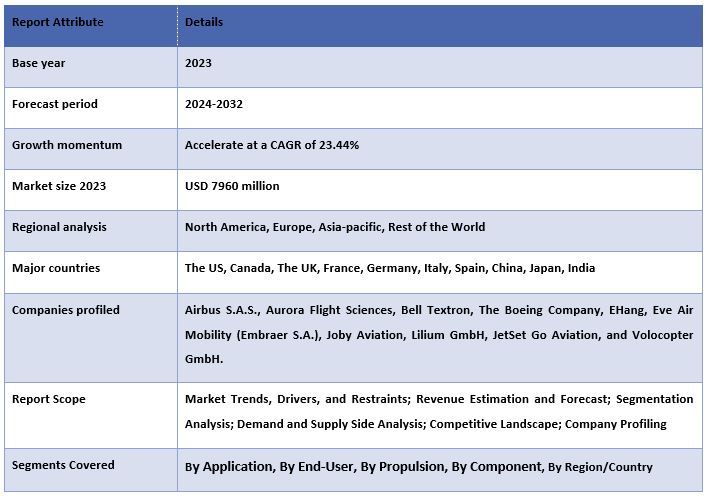
Reasons to buy this report:
- The study includes market sizing and forecasting analysis validated by authenticated key industry experts.
- The report presents a quick review of overall industry performance at one glance.
- The report covers an in-depth analysis of prominent industry peers with a primary focus on key business financials, product portfolios, expansion strategies, and recent developments.
- Detailed examination of drivers, restraints, key trends, and opportunities prevailing in the industry.
- The study comprehensively covers the market across different segments.
- Deep dive regional level analysis of the industry.
Customization Options:
The Global Advanced Air Mobility market can further be customized as per the requirement or any other market segment. Besides this, UMI understands that you may have your own business needs; hence, feel free to connect with us to get a report that completely suits your requirements.
Table of Content
Research Methodology for the Global Advanced Air Mobility Market Analysis (2024-2032)
Analyzing the historical market, estimating the current market, and forecasting the future market of the Global Advanced Air Mobility market were the three major steps undertaken to create and analyze the adoption of Global Advanced Air Mobility in major regions globally. Exhaustive secondary research was conducted to collect the historical market numbers and estimate the current market size. Secondly, to validate these insights, numerous findings and assumptions were taken into consideration. Moreover, exhaustive primary interviews were also conducted with industry experts across the value chain of the Global Advanced Air Mobility market. Post assumption and validation of market numbers through primary interviews, we employed a top-down/bottom-up approach to forecasting the complete market size. Thereafter, market breakdown and data triangulation methods were adopted to estimate and analyze the market size of segments and sub-segments of the industry. Detailed methodology is explained below:
Analysis of Historical Market Size
Step 1: In-Depth Study of Secondary Sources:
A detailed secondary study was conducted to obtain the historical market size of the Global Advanced Air Mobility market through company internal sources such as annual reports & financial statements, performance presentations, press releases, etc., and external sources including journals, news & articles, government publications, competitor publications, sector reports, third-party database, and other credible publications.
Step 2: Market Segmentation:
After obtaining the historical market size of the Global Advanced Air Mobility market, we conducted a detailed secondary analysis to gather historical market insights and share for different segments & sub-segments for major regions. Major segments are included in the report as by application, by end-user, by propulsion and by component. Further regional/country-level analyses were conducted to evaluate the overall adoption of testing models in that region.
Step 3: Factor Analysis:
After acquiring the historical market size of different segments and sub-segments, we conducted a detailed factor analysis to estimate the current market size of the Global Advanced Air Mobility market. Further, we conducted factor analysis using dependent and independent variables such as by application, by end-user, by propulsion and by component in the Global Advanced Air Mobility market. A thorough analysis was conducted for demand and supply-side scenarios considering top partnerships, mergers and acquisitions, business expansion, and product launches in the Global Advanced Air Mobility market sector across the globe.
Current Market Size Estimate & Forecast
Current Market Sizing: Based on actionable insights from the above 3 steps, we arrived at the current market size, key players in the Global Advanced Air Mobility market, and market shares of the segments. All the required percentage shares split and market breakdowns were determined using the above-mentioned secondary approach and verified through primary interviews.
Estimation & Forecasting: For market estimation and forecast, weights were assigned to different factors, including drivers & trends, restraints, and opportunities available for the stakeholders. After analyzing these factors, relevant forecasting techniques, i.e., the top-down/bottom-up approach, were applied to arrive at the market forecast for 2032 for different segments and sub-segments across the major markets globally. The research methodology adopted to estimate the market size encompasses:
- The industry’s market size, in terms of revenue (USD) and the adoption rate of the Global Advanced Air Mobility market across the major markets domestically
- All percentage shares, splits, and breakdowns of market segments and sub-segments
- Key players in the Global Advanced Air Mobility market in terms of products offered. Also, the growth strategies adopted by these players to compete in the fast-growing market.
Market Size and Share Validation
Primary Research: In-depth interviews were conducted with the Key Opinion Leaders (KOLs), including Top Level Executives (CXO/VPs, Sales Head, Marketing Head, Operational Head, Regional Head, Country Head, etc.) across major regions. Primary findings were then summarized, and statistical analysis was performed to prove the stated hypothesis. Inputs from primary research were consolidated with secondary findings, hence turning information into actionable insights.
Split of Primary Participants in Different Regions
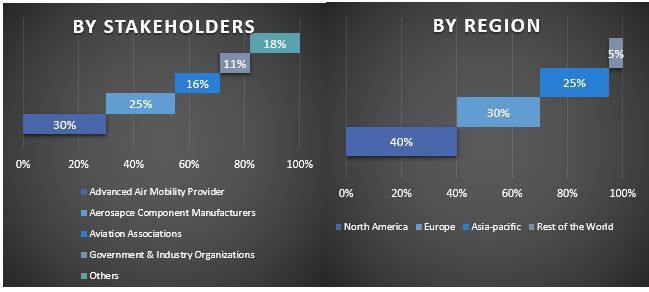
Market Engineering
The data triangulation technique was employed to complete the overall market estimation and to arrive at precise statistical numbers for each segment and sub-segment of the Global Advanced Air Mobility market. Data was split into several segments and sub-segments after studying various parameters and trends by application, by end-user, by propulsion and by component in the Global Advanced Air Mobility market.
The main objective of the Global Advanced Air Mobility Market Study
The current & future market trends of the Global Advanced Air Mobility market were pinpointed in the study. Investors can gain strategic insights to base their discretion for investments on the qualitative and quantitative analysis performed in the study. Current and future market trends determined the overall attractiveness of the market at a regional level, providing a platform for the industrial participant to exploit the untapped market to benefit from a first-mover advantage. Other quantitative goals of the studies include:
- Analyze the current and forecast market size of the Global Advanced Air Mobility market in terms of value (USD). Also, analyze the current and forecast market size of different segments and sub-segments.
- Segments in the study include areas by application, by end-user, by propulsion and by component.
- Define and analyze the regulatory framework for global Advanced Air Mobility industry.
- Analyze the value chain involved with the presence of various intermediaries, along with analyzing customer and competitor behaviors of the industry.
- Analyze the current and forecast market size of the Global Advanced Air Mobility market for the major regions.
- Major countries of regions studied in the report include North America (The US, Canada, and Rest of North America), Europe (The UK, France, Germany, Italy, Spain, Rest of Europe), Asia-pacific (China, Japan, India, Rest of the Asia-pacific), Rest of the World
- Company profiles of the Global Advanced Air Mobility market and the growth strategies adopted by the market players to sustain in the fast-growing market.
- Deep dive regional level analysis of the industry
Frequently Asked Questions FAQs
Q1: What is the current market size and growth potential of the Global Advanced Air Mobility market?
Q2: What is the driving factor for the growth of the Global Advanced Air Mobility market?
Q3: Which segment has the largest share of the Global Advanced Air Mobility market by End-User?
Q4: Which region will dominate the Global Advanced Air Mobility market?
Related Reports
Customers who bought this item also bought










